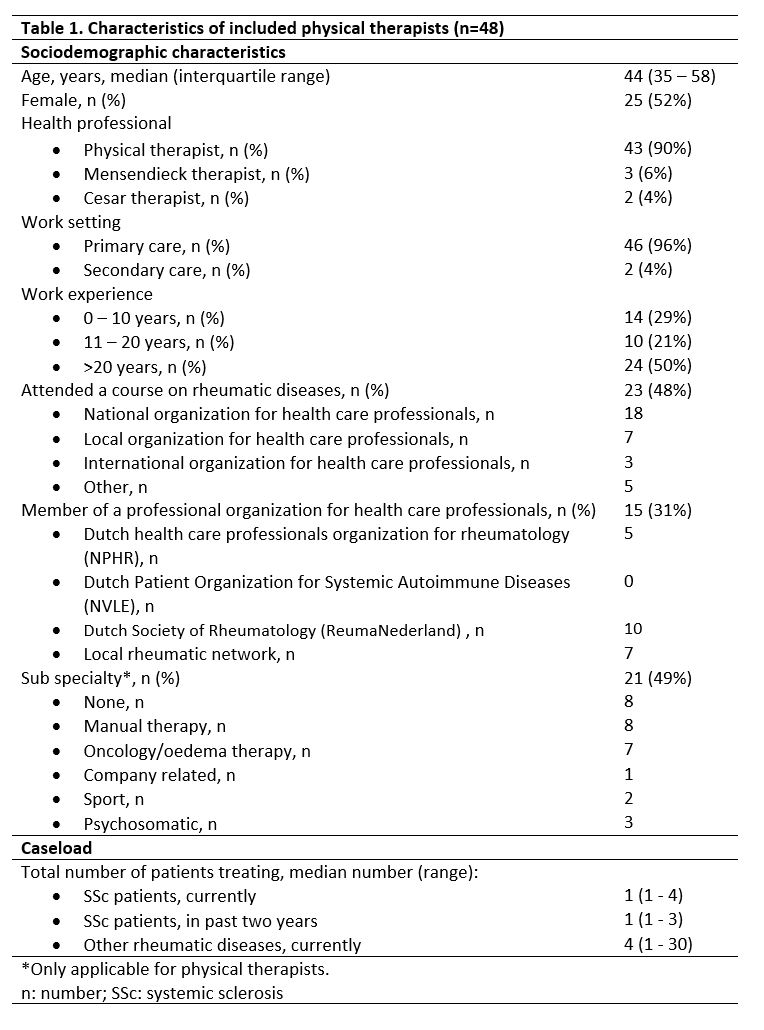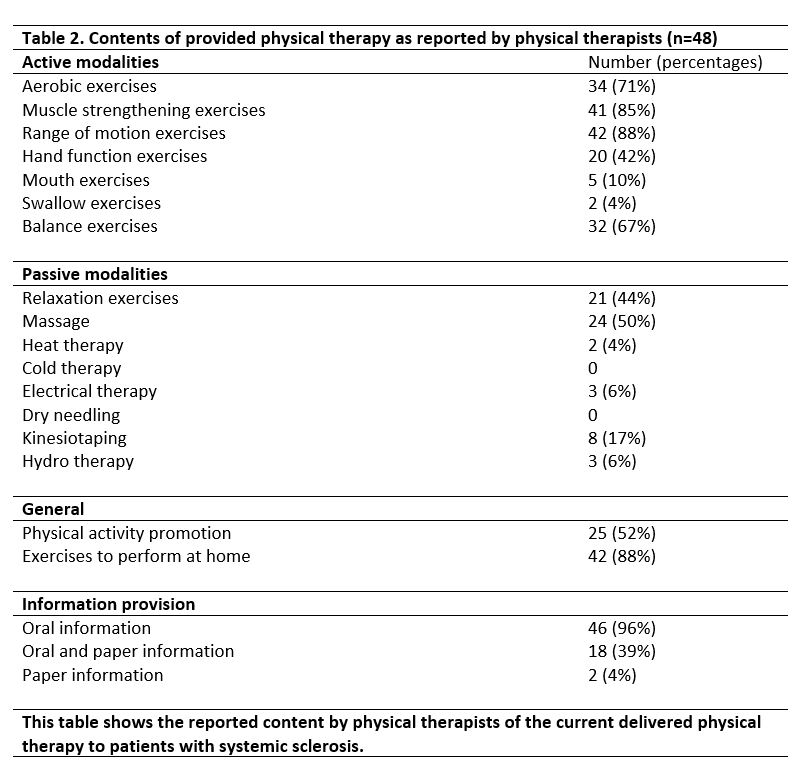Session Information
Session Type: Poster Session C
Session Time: 9:00AM-11:00AM
Background/Purpose: As there is currently no cure available for systemic sclerosis (SSc), nonpharmacologic care is an essential element in the management of the disease. Physical therapy is often used by SSc patients, but evidence on its optimal content is scarce and practice highly variable. To improve the delivery of care perspectives of the health care professional are crucial. Therefore, this study aimed to assess the perspectives of physical therapists treating patients with SSc on their current practice and educational needs regarding physical therapy.
Methods: SSc patients who participated in a cross-sectional study on the use of physical therapy were asked to invite their treating physical therapist, if applicable, to complete a questionnaire. The questionnaire consisted of 37 questions regarding sociodemographic information (thirteen questions), the content of treatment employed (eight questions), perceived knowledge and skills (four questions) and educational needs (twelve questions). The survey consisted of dichotomous- (yes/no) or multiple-choice questions, and multiple-answer options.
Results: In total, 127 patients reported the use of physical therapy over the past two years, and 48 physical therapists returned the questionnaire. Their median age was 44 years, 52% was female and 50% had more than 20 years of working experience. The median number of SSc patients currently treated was 1 (range: 1 – 4). Eighty-three percent (n=44) of physical therapists received a referral, of whom two-third (n=30/44) from a rheumatologist. Seventy percent (n=32/44) stated a perceived lack of medical information concerning the patient’s disease manifestations in the referral letter. Range of motion (n=42, 88%), muscle strengthening (n=41, 85%) and aerobic (n=34, 71%) exercises were most often reported, followed by hand (n=20, 42%) and mouth (n=5, 10%) exercises. Concerning passive modalities, massage (n=24, 50%) and relaxation exercises (n=21, 44%) were performed most frequently. Thirty-five percent (n=11) indicated that a lack of knowledge on SSc was a problem during the treatment, meanwhile 98% (n=47) had tried to get more information on the disease; Google (n=32/47, 67%), asking the patient (n=25/47, 52%) or Pubmed (n=19/47, 40%) were the most frequently mentioned sources of information. Eighty-five percent (n=41) expressed the need for an interactive website with information on treatment of SSc patients specifically designed for physical therapists and 77% (n=37) for additional courses on SSc, with online delivery preferred by most of them (n=28/37, 76%).
Conclusion: The large majority of physical therapists treating patients with systemic sclerosis used active treatment modalities, but passive modalities were also relatively frequent. Additionally, more than 75% expressed an unmet need regarding information and education on systemic sclerosis. The development of such educational activities could be a starting point to optimize the content and quality of physical therapy and therefore could contribute to improvement of quality of multidisciplinary care in systemic sclerosis.
 Table 1. Characteristics of included physical therapists (n=48)
Table 1. Characteristics of included physical therapists (n=48)
 Table 2. Contents of provided physical therapy as reported by physical therapists (n=48)
Table 2. Contents of provided physical therapy as reported by physical therapists (n=48)
To cite this abstract in AMA style:
Liem S, van Leeuwen N, Vliet Vlieland T, de Pundert L, Schriemer R, Spierings J, Vonk M, de Vries-Bouwstra J. Physical Therapy in Patients with Systemic Sclerosis: The Perspective of Physical Therapists on Current Delivery and Educational Needs [abstract]. Arthritis Rheumatol. 2020; 72 (suppl 10). https://acrabstracts.org/abstract/physical-therapy-in-patients-with-systemic-sclerosis-the-perspective-of-physical-therapists-on-current-delivery-and-educational-needs/. Accessed .« Back to ACR Convergence 2020
ACR Meeting Abstracts - https://acrabstracts.org/abstract/physical-therapy-in-patients-with-systemic-sclerosis-the-perspective-of-physical-therapists-on-current-delivery-and-educational-needs/
